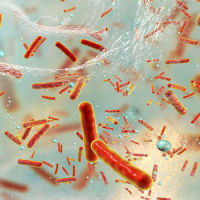A new treatment pathway for antibiotic resistant bacteria and infectious diseases with benefits for patients and care providers is described in a report in American Journal of Respiratory and Critical Care Medicine. Researchers say the unusual approach of removing antibodies from the blood stream could reduce the effects of chronic infections, the requirement for days spent in hospital and the use of antibiotics.
See Also: Antibiotic Resistance in the ICU: Time to Take Things Seriously!
The new treatment involves a process known as plasmapheresis that is somewhat like kidney dialysis. In the study, two patients volunteered to be part of this explorative treatment that built on previous findings (2014) from the same team of researchers from University of Birmingham and Newcastle University. Both the patients with bronchiectasis also suffered with chronic Pseudomonas aeruginosa infections that were resistant to many antibiotics. The plasmapheresis involved the removal, treatment, and return of blood plasma from circulation, and was done five times in a week in order to remove antibody from the patients. The antibodies were then replaced with those from blood donations.
This treatment restored the ability for the patients' blood to kill their infecting Pseudomonas, said Dr. Tony De Soyza, Bronchiectasis service lead, Newcastle Upon Tyne Hospitals Trust.
Professor Ian Henderson, Director of the Institute of Microbiology and Infection at the University of Birmingham, explained:
"These patients had an excess of a particular antibody in the bloodstream. In contrast to the protective effect normally associated with antibody, in these patients the antibody stopped the immune system killing the Pseudomonas aeruginosa bacterium and this worsened the patients' lung disease. Perhaps counter-intuitively, we decided to remove this antibody from the bloodstream and the outcomes were wholly positive."
Both patients reported a rapid improvement in health and wellbeing, greater independence and improved mobility compared to any point in the previous two years.
Pseudomonas aeruginosa is a common bacterium that can cause disease and is known as a multidrug resistant pathogen, recognised for its advanced antibiotic resistance mechanisms and association with serious illnesses. Chronic Pseudomonas lung infections commonly occur in patients suffering from bronchiectasis, a disease that leads to permanent enlargement of the airways in the lung. Symptoms of bronchiectasis typically include a chronic cough, shortness of breath, coughing up blood, and chest pain.
The research team plans to do longer-term studies to investigate whether an earlier intervention, with slightly less aggressive therapies, could help prevent disease progression in patients, according to Professor Henderson.
Source: University of Birmingham
Image Credit: University of Birmingham
References:
Timothy J. Wells, John Davison, Emma Sheehan, Suren Kanagasundaram,
Gavin Spickett, Calman A. MacLennan, Robert A. Stockley, Adam F.
Cunningham, Ian R. Henderson, Anthony De Soyza. (2017). The Use of Plasmapheresis in Patients with Bronchiectasis with Pseudomonas aeruginosa Infection and Inhibitory Antibodies. American Journal of Respiratory and Critical Care Medicine; 195 (7): 955 DOI: 10.1164/rccm.201603-0599LE
Latest Articles
infectious diseases, Antibiotic Resistant Bacteria, plasmapheresis, Pseudomonas aeruginosa
A new treatment pathway for antibiotic resistant bacteria and infectious diseases with benefits for patients and care providers is described in a report in American Journal of Respiratory and Critical Care Medicine.
























